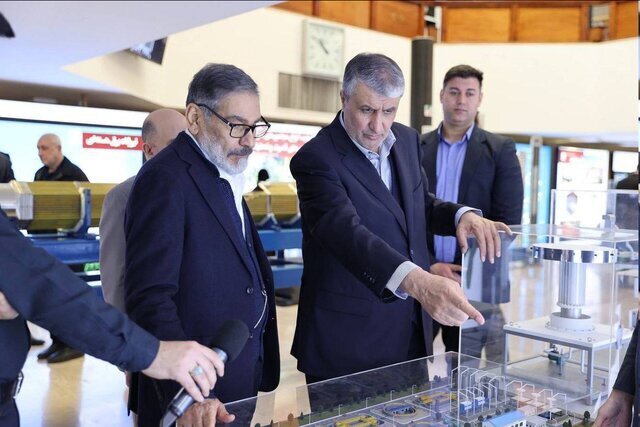Iran vows to defend nuclear program "with all its might"

TEHRAN – Iran is committed to defending its legal rights regarding its peaceful nuclear program with all possible means, stated Ali Shamkhani, a political advisor to Leader of the Islamic Revolution Ayatollah Seyyed Ali Khamenei, during a visit to the Atomic Energy Organization of Iran (AEOI) on Tuesday.
Shamkhani, formerly the secretary of Iran's National Security Council, toured the AEOI's latest achievements and advancements in the nuclear industry. His remarks come as for the past few weeks; Western media has been advocating for U.S. strikes on Iranian nuclear sites.
“There is nothing we won’t do to guard our right to a peaceful nuclear program,” Samkhani said according to a report published on the AEOI’s website.
Shamkhani's comments aligned with previous firm statements from other high-ranking Iranian officials. Kamal Kharrazi, an advisor to Iran's Leader and head of the country's Foreign Policy Council, warned in an interview last year that Iran would rethink its doctrine if its nuclear sites were harmed.
“[Iran has] no intention of producing a nuclear bomb, but if [its] existence is threatened, we will be forced to change our nuclear doctrine,” he told the Financial Times in May.
Ayatollah Khamenei has prohibited the development of weapons of mass destruction, including nuclear weapons, by issuing a fatwa (religious decree) in the early years of his leadership. He has reiterated this stance on numerous occasions in the years since.
In his Tuesday remarks, Shamkhani repeated Iran’s stance on the development of nukes. "Iran has never sought nuclear weapons and will not do so." He added, however, that Iran is determined to defend its rights, both "in political and technical dimensions with all its might."
The former security chief also stressed that nuclear technology is essential for the future of Iran, "Nuclear technology will not only create significant values for the country in the production of clean and renewable energy but will also be very decisive and influential in areas such as agriculture, medicine, pharmaceuticals, water resource management, and environmental protection."
Israel is the main proponent of attacks on Iran's nuclear facilities, having a history of assassinating Iranian nuclear scientists and attempting sabotage over the past three decades. It has consistently lobbied Washington to strike Iran's nuclear sites. While Western analysts doubt the U.S.'s ability to destroy Iran's heavily fortified underground facilities, they warn that such actions would dangerously escalate regional tensions and have significant repercussions for Iran, the U.S., and the broader West Asia.
In the course of an ongoing military drill last month, Iranian Armed Forces practiced downing bunker busters over the country's nuclear facilities scattered across its territory.
The international community is now watching to see if U.S. President Donald Trump will undo the damage he inflicted on the Iran nuclear deal in 2018 and rejoin the JCPOA. Supporters of the pact point to claims by its Iranian negotiator Mohammad Javad Zarif, who stated recently that the JCPOA ensured Iran would not be able to "develop nuclear weapons for at least 15 years,” even if constant escalating threats were to force it to rethink its doctrine.
Observers also point to Trump’s failed “maximum pressure campaign” that followed his exit from the deal. The campaign which reinstated and intensified sanctions against Iran managed to harm its economy but did not reach its main objective, which was to dismantle the country’s nuclear program. Iran began new and unprecedented nuclear advancements under the watch of the International Atomic Energy Agency (IAEA) in 2020 after the remaining signatories to the deal failed to take the sting out of U.S. sanctions.
Western reports on Tuesday said Trump is poised to renew his anti-Iran maximum pressure campaign soon.
Leave a Comment